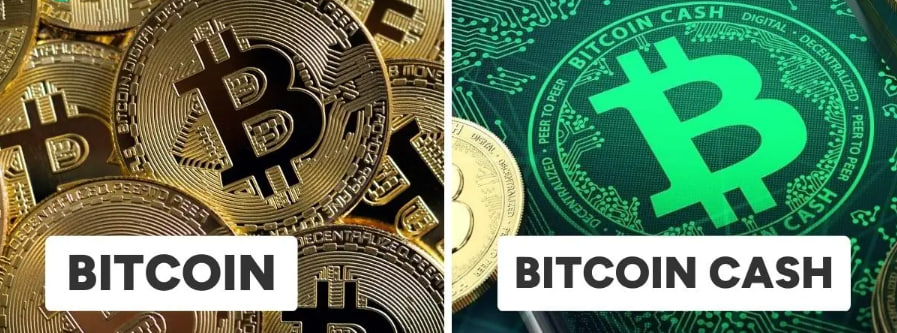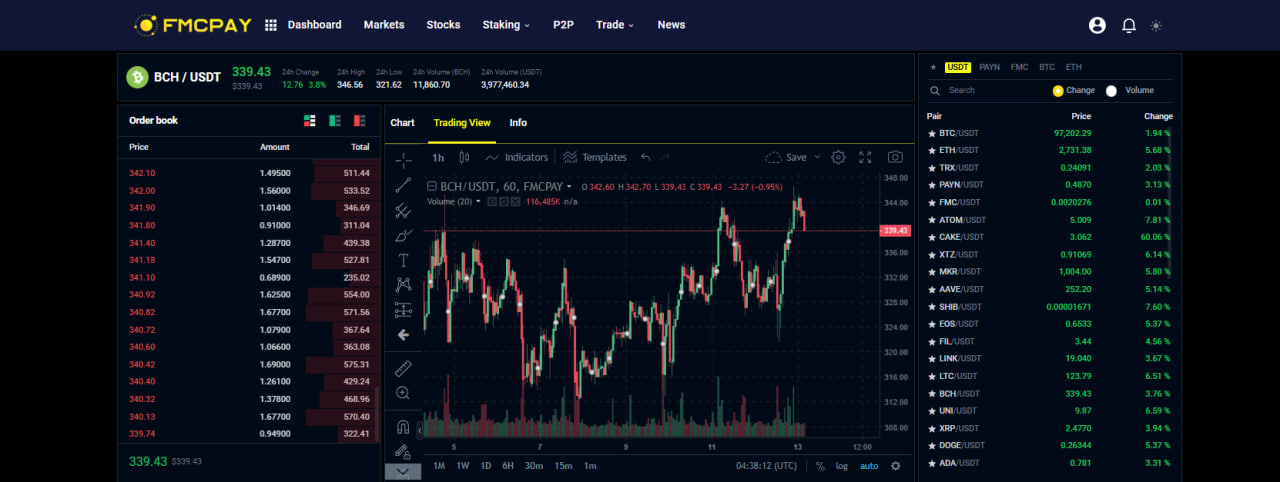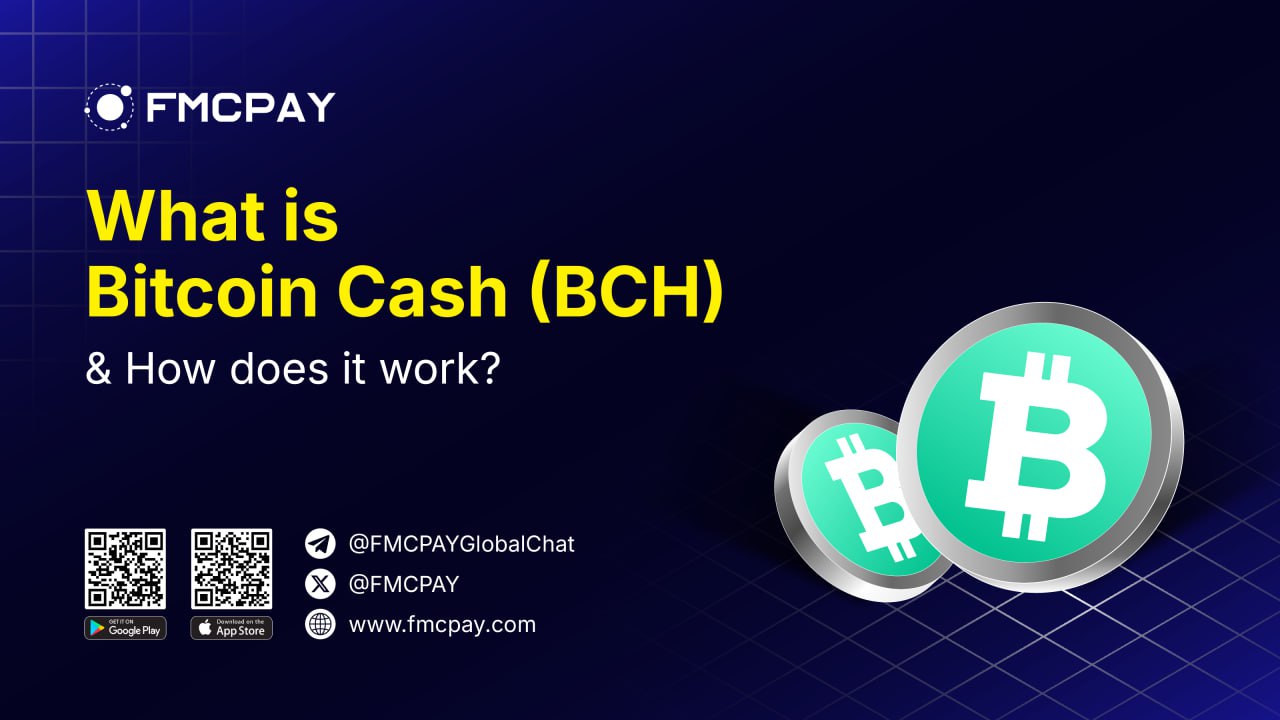Everyone knows about Bitcoin, but what about Bitcoin Cash? If you’ve ever browsed the list of top cryptocurrencies by market cap on CoinMarketCap or CoinGecko, you might have wondered why there are two different “Bitcoin” on the list.
So, what is Bitcoin Cash (BCH), how does it work, and how is it different from Bitcoin (BTC)? Let’s explore everything in this article with FMCPAY!
1. What Is Bitcoin Cash (BCH)?
Bitcoin (BTC) is the most well-known cryptocurrency in the world. However, as its popularity grew, the network faced challenges such as slow transaction speeds and high fees due to the limited block size of 1 MB. This restriction made Bitcoin less convenient for everyday small transactions.
So, what is Bitcoin Cash (BCH)? Bitcoin Cash is a cryptocurrency that was created as a result of a hard fork from Bitcoin in August 2017. It was created primarily to address the growing concerns over Bitcoin’s scalability. By increasing the block size, Bitcoin Cash allows more transactions to be processed per block, improving efficiency and reducing fees.

Key Points:
- Definition: Bitcoin Cash is an altcoin version of Bitcoin that resulted from a hard fork in the blockchain.
- Objective: Enable faster transaction times and maintain its position as a payment method.
- Features: Bitcoin Cash allows a greater number of transactions in a single block compared to Bitcoin, which reduces fees and transaction times.
- Functionality: Designed to be used as a cheap payment system with community-driven governance, aligning with Bitcoin’s original intention. Transaction fees are generally lower, and confirmation times are significantly less than Bitcoin’s, often within seconds.
2. History of Bitcoin Cash
Launched in 2017, Bitcoin Cash has come a long way in its development. To gain a deeper understanding of what is Bitcoin Cash, let’s take a look back at its history.
2.1. The Creation of Bitcoin Cash
Bitcoin’s blockchain encountered significant scalability challenges as transaction volumes kept growing. Due to Bitcoin’s 1MB block size limitation, the network struggled to process this large number of transactions efficiently. With blocks reaching capacity, transactions often queued up, awaiting confirmation.
As a result, transactions became slower, and fees escalated significantly. Between 2009 and 2016, Bitcoin’s transaction fees steadily increased. By June 2017, the average fee exceeded $5, and by December of that year, it skyrocketed past $54.
A faction of the Bitcoin community proposed increasing the block size as a solution. They believed that Bitcoin had become more of an investment instrument than a payment system. It was originally designed by Satoshi as a peer-to-peer payment system that removes regulatory authorities and other third parties from financial transactions, but now it has become something else.
However, not everyone agreed with this approach. A different group advocated for off-chain solutions, such as the Lightning Network, which aimed to process transactions outside the main blockchain. This division in ideology led to one of the most significant events in Bitcoin’s history: the hard fork of August 2017, which resulted in the creation of Bitcoin Cash (BCH).

2.2. Bitcoin Cash’s Developments
Bitcoin Cash introduced a larger block size of 8MB (later expanded to 32MB) to support more transactions per block. This increase aimed to reduce network congestion and keep transaction fees low, making BCH a more practical alternative for everyday payments.
After its launch, what is Bitcoin Cash became a widely discussed topic in the crypto industry. It quickly gained recognition and was listed on major cryptocurrency exchanges including FMCPAY, Coinbase, Kraken, and others. Additionally, it received backing from several developers, merchants, and businesses that supported its vision of fast, low-cost transactions. However, the evolution of Bitcoin Cash did not stop there.
Do you know what is Bitcoin Cash’s other big event in November 2018? Yes, another hard fork occurred, leading to the creation of a new cryptocurrency: Bitcoin SV (BSV). The split arose from disagreements over network upgrades, with the Bitcoin SV camp (led by Craig Wright and Calvin Ayre) advocating for a 128MB block size to maintain what they believed was Satoshi Nakamoto’s original design.
Since 2019, Bitcoin Cash has undergone multiple upgrades to enhance its scalability, security, and performance, including smart contract capabilities and better transaction stability. Despite these advancements, Bitcoin Cash faces ongoing challenges, including competition from other cryptocurrencies, a lack of widespread adoption compared to Bitcoin, and debates over its long-term vision.
Nonetheless, the Bitcoin Cash ecosystem remains active, with a dedicated community of developers and supporters continuing to improve its functionality. Its fast and low-fee transactions still make it a viable option for payments, particularly in regions where traditional financial systems are limited.
2.3. A Potential Collaboration with Cardano
On May 6, 2024, discussions about what is Bitcoin Cash took a new turn with a major development. Cardano founder Charles Hoskinson proposed an idea on X (formerly Twitter) to integrate Bitcoin Cash with Cardano’s blockchain technology. This concept would turn Bitcoin Cash into a “Partnerchain” of Cardano, making it the fastest and most efficient Proof-of-Work blockchain.
Though still in the early stages, Hoskinson’s proposal has generated significant interest within the crypto community. If implemented, it could open new opportunities for what is Bitcoin Cash, strengthening its market position and expanding its use cases.
Despite the challenges, Bitcoin Cash continues to evolve, maintaining its goal of offering a scalable and efficient peer-to-peer digital currency. Whether through technical upgrades or strategic partnerships, its journey remains one of the most exciting in the cryptocurrency space.
3. Bitcoin vs. Bitcoin Cash Comparison
Bitcoin and Bitcoin Cash share many similarities, but they also have key differences that impact their use cases and adoption. To better understand what is Bitcoin Cash, here’s a comparison of the two:

Block Size and Transaction Speed
Bitcoin Cash significantly increased the block size from Bitcoin’s 1MB to 8MB (later 32MB), allowing for more transactions per block. This results in faster processing times and lower fees, making Bitcoin Cash more suitable for everyday payments.
Transaction Fees
Bitcoin transaction fees can be high, especially during times of heavy network congestion. What is Bitcoin Cash in comparison? It offers lower fees due to its larger block size, making it a more cost-effective option for users who frequently send and receive cryptocurrency.
Smart Contract Capability
While Bitcoin primarily focuses on being a store of value, Bitcoin Cash has explored additional functionalities, including smart contract capabilities. Though not as advanced as Ethereum, Bitcoin Cash supports projects and innovations that expand its use beyond simple transactions.
Adoption and Community Support
Bitcoin remains the dominant cryptocurrency in terms of market capitalization, institutional adoption, and public awareness. Bitcoin Cash, while also popular, has a smaller user base and less mainstream acceptance compared to Bitcoin. However, it is still accepted by merchants and businesses that support cryptocurrency payments.
Security and Network Stability
Bitcoin has a larger and more secure network due to its higher hash rate and greater mining participation. Bitcoin Cash, although secure, has a smaller mining pool, which can make it more vulnerable to certain attacks compared to Bitcoin’s network.
|
Name |
Bitcoin (BTC) | Bitcoin Cash (BCH) |
|
Block size |
1 MB |
8 MB |
|
Consensus |
Proof of Work |
Proof of Work |
|
Algorithm |
SHA256 |
SHA256 |
|
SegWit |
No |
Yes |
|
Max supply |
21 Million |
21 Million |
|
Address |
P2PKH & P2SH |
P2PKH & P2SH |
Do you know what is Bitcoin Cash’s main difference from Bitcoin?
4. Where to Buy Bitcoin Cash Crypto?
Now that you know what is Bitcoin Cash, would you consider investing in it? As a popular cryptocurrency with a large market cap, you can find it on most crypto trading and storage platforms. Here are some common ways to buy Bitcoin Cash (BCH):
Cryptocurrency Exchanges
Major exchanges like Binance, Coinbase, and FMCPAY allow users to buy, sell, and trade Bitcoin Cash. Users can purchase BCH using fiat currencies (USD, EUR, etc.) or by trading it for other cryptocurrencies.

Peer-to-Peer (P2P) Platforms
P2P platforms enable users to buy Bitcoin Cash directly from other individuals. Platforms like LocalBitcoinCash and Paxful offer escrow services to ensure secure transactions.
Bitcoin ATMs
Some Bitcoin ATMs support Bitcoin Cash transactions, allowing users to buy BCH using cash or a debit card. However, availability depends on the location.
Crypto Wallets with Integrated Purchase Options
Certain wallets, such as Trust Wallet and Bitcoin.com Wallet, allow users to purchase Bitcoin Cash directly through integrated exchange services.
Decentralized Exchanges (DEXs)
Many decentralized exchanges also support Bitcoin Cash trading, enabling users to buy and sell BCH without the need for a central authority.
5. How to Buy Bitcoin Cash on FMCPAY
Now that you understand what is Bitcoin Cash, you might be considering adding it to your portfolio. As a well-known cryptocurrency, Bitcoin Cash can be easily purchased on major exchanges like FMCPAY. We offer a simple and beginner-friendly process to acquire BCH. Here’s how you can get started:
- Create an Account: Sign up on FMCPAY.com by entering your email address and setting a secure password.
- Verify Your Identity: Complete FMCPAY’s KYC verification process to unlock full trading access.
- Deposit Funds: Add funds to your account using your preferred payment method.
- Buy BCH: Go to the trading section on FMCPAY and select the BCH/USDT trading pair.
- Confirm Your Purchase: Enter the amount of BCH you want to buy and finalize the transaction.
FMCPAY makes it easy to access BCH and be part of the Bitcoin Cash ecosystem. Whether you’re just learning about what is Bitcoin Cash or already investing, FMCPAY helps you explore many of its utilities. With its fast and low-cost transactions, Bitcoin Cash continues to be a versatile digital asset worth considering.
6. FAQ about Bitcoin Cash Crypto
Bitcoin Cash (BCH) is often misunderstood with Bitcoin, so we’ve prepared the most frequently asked questions to help clarify its key features. If you’re still asking “what is Bitcoin Cash”, you’re in the right place.
[Q] Is Bitcoin Cash the Same as Bitcoin?
[A] No, Bitcoin Cash is a separate cryptocurrency that originated from Bitcoin through a hard fork in 2017. While they share a common history, Bitcoin Cash has a larger block size and different scaling approach, making it more suitable for transactions.
[Q] Is Bitcoin Cash Safe?
[A] Yes, Bitcoin Cash operates on a decentralized blockchain with strong cryptographic security. However, its smaller network size compared to Bitcoin makes it somewhat more susceptible to attacks.
[Q] Is It OK to Invest in Bitcoin Cash?
[A] Investing in Bitcoin Cash, like any cryptocurrency, carries risks. However, for those who believe in its long-term potential and usability as digital cash, it can be a valuable addition to a diversified crypto portfolio.
[Q] What is Bitcoin Cash’s main advantage over Bitcoin?
[A] The main advantage of Bitcoin Cash over Bitcoin is its larger block size, which allows for faster transactions and lower fees. This makes Bitcoin Cash more practical for daily transactions.
[Q] What is Bitcoin Cash’s main limitation compared to Bitcoin?
[A] The main limitation of Bitcoin Cash compared to Bitcoin is its lower adoption rate and smaller network security. Since Bitcoin has more miners and a higher hash rate, it is generally considered the more secure blockchain.
Conclusion
Bitcoin Cash is a viable alternative to Bitcoin, offering faster transactions and lower fees due to its larger block size. Understanding “what is Bitcoin Cash” helps investors and users make informed decisions about its potential as a payment system and investment asset.
Since its introduction in 2017, Bitcoin Cash has continued to evolve, maintaining a dedicated user base and growing adoption among merchants. With ongoing development and growing adoption, Bitcoin Cash remains an important player in the cryptocurrency ecosystem.
Ready to explore Bitcoin Cash? Start trading BCH/USDT today on FMCPAY and take advantage of its fast, low-cost transactions!

